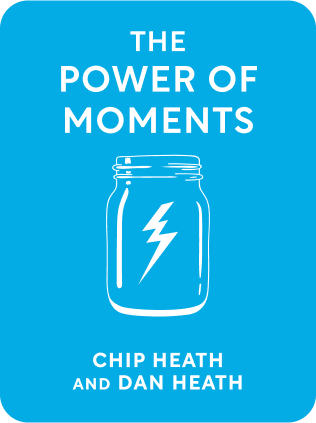

This article is an excerpt from the Shortform book guide to "The Power of Moments" by Chip Heath and Dan Heath. Shortform has the world's best summaries and analyses of books you should be reading.
Like this article? Sign up for a free trial here .
Why do we remember certain things but forget others? What makes an experience memorable?
According to Chip and Dan Heath, the authors of The Power of Moments, there are two psychological factors that make an experience memorable: 1) the peak-end rule and 2) novelty and unexpectedness. Once you understand the psychology behind memorable moments, you can engineer small, everyday moments to stand out in your memory just as much as special moments.
In this article, we’ll explore what makes a moment memorable, and how you can engineer memorable moments on demand.
2 Psychological Phenomena That Form Defining Moments
Why do we remember certain things but forget others? There are two psychological phenomena that determine which experiences tend to stand out in your memory.
1) The Peak-End Rule
It’s obvious why some events—like marriage, or having kids—would stand out on the timeline of your life. But what about smaller, simpler moments such as a particular family vacation or an outing with a friend?
Typically, the way you recall special memories is shaped by the “peak-end rule,” proposed by psychologists Barbara Frederickson and Daniel Kahneman (author of Thinking, Fast and Slow). The peak-end rule states that when people reflect on an experience, they tend to ignore the duration of the experience. Instead, they focus on two key parts:
- The emotional peaks—the moments of strongest positive or negative emotion
- The end of the experience.
Imagine you spend a day at the beach with your kids. The drive is long, and it’s cloudy when you arrive. As you set up your umbrella and blanket, the sun finally peeks out. Around lunchtime, your kids are delighted to see a pod of dolphins playing just offshore. By the end of the day, everyone is exhausted, sunburned, and a little cranky. You pack up just before dark and spot an ice cream truck on the walk to the car, so everyone ends the day snacking on their favorite ice cream.
If you were asked about your day right after finishing your ice cream, you’d reflect on all the events of the day and chalk it up to a fairly average experience. However, if you were approached several weeks later and asked to reflect on the day, you’d likely give it a rave review. This is because, according to the peak-end rule, the parts of the day that will stand out in your memory are seeing dolphins (the peak) and eating your favorite ice cream with your kids (the end). All the other parts of the day—the cloudy sky, the sunburn, the long drive—fade into the background of these two positive experiences.
Longer Timelines Warp the Peak-End Rule
Kahneman’s research shows that the peak-end rule holds when an experience is relatively short and has a definite beginning and end—a day at the beach or a week of camping, for example. However, the Heaths explain that when it comes to recalling long-term experiences, the peak-end rule changes.
Peak: Peaks retain their importance—that is, one or two exceptional moments can make a mundane experience stand out in your memory as wholly amazing.
- For example, you start a new job. Your company sets up an incredible orientation program, and in your seventh month you receive the sales team’s “MVP Award.” Looking back on this first year, you might report it as a great experience, though most of your time was spent on meetings, dull tasks, or filing paperwork. The mundane day-to-day events fade into the background of several exceptional events.
End: On the other hand, endings tend to lose their importance and blur with beginnings. When you left college and headed into your first job, it was both an ending and a beginning. When it comes to long-term experiences, it makes more sense to think in terms of transitions rather than beginnings and endings.
This builds to the Heaths’ main point: When you think back on your life, you won’t recall every moment, nor will you consider your life’s “average” happiness. Your memory will naturally highlight positive peaks and transitional experiences.
| Your Experiencing Self Versus Your Remembering Self In Thinking, Fast and Slow, Kahneman underscores the benefits of focusing on the creation of exceptional moments in the present. His research reveals that we have two “selves”: The experiencing self, who feels the moment-to-moment emotions of an experience—their evaluation of the experience is a sum of the emotions they felt.The remembering self, who reflects on past experiences—their evaluation of the experience depends on the peak-end rule (that is, they base their evaluation on the most emotionally intense moments and the end.) You tend to naturally give more weight to your remembering self because you make most of your decisions based on your memory of an event. Kahneman, however, suggests that you can have more pleasure by consciously giving more weight to your experiencing self, spending more time creating moment-to-moment happiness. The Heaths’ creation of defining moments that increase our day-to-day happiness and engagement aligns with this argument. |
2) Novelty or Unexpectedness
A second reason defining moments stand out is that your brain responds more actively to novelty than it does to routine. Imagine you were watching identical images of a dolphin flash across a screen, every image appearing for exactly two seconds. Suddenly, in the middle of all these dolphins, a photo of a red backpack flashes across the screen for exactly two seconds. A psychological study has found that, if you were to report afterward how long each image stayed on the screen, you would claim that the red backpack was on the screen for significantly more time than the identical dolphins, even though every image was shown for two seconds.
This happens because after seeing the same image multiple times, your brain doesn’t need to process any more information about it and “checks out.” When the new image suddenly appears, your brain re-engages. It processes a lot of new information in the same amount of time it was previously processing no new information—this tricks you into thinking you were seeing the image for a longer period of time.
What Does This Mean for Defining Moments?
So far, the Heaths have explained that increasing the number of defining moments in your life means that you have more positive memories to look back on and a more present, slowed-down engagement with your life.
Before they get into different methods of creating such moments, the Heaths discuss two foundational aspects of defining moments: they’re both meaningful and memorable.
What Makes a Moment Meaningful?
To engineer meaning, the Heaths say your moment should incorporate at least one of four emotion-boosting elements:
- Elevation: The moment is elevated beyond everyday experience, either through sensory pleasures or the element of surprise.
- Insight: The moment helps you discover something new about the world or yourself. Often, these moments have a transformative and influential effect on the course of your life.
- Pride: The moment gives you a sense of validation around your achievements or a sense of pride in your actions.
- Connection: The moment makes you feel more deeply connected to whomever shares it with you, and strengthens your relationship with them.
The Heaths emphasize that a defining moment doesn’t need to use all four of these emotion-boosters—just one or two will do.
Shortform Commentary: Where These Four Elements Come From
The Heaths don’t note the exact research that led them to these four elements, but their ideas align closely with those of psychologist Abraham Maslow. Maslow is well-known for his “hierarchy of needs”:
Maslow’s hierarchy of needs describes the requirements for a person to become self-actualizing—constantly growing, discovering, and finding meaning in her life. The Heaths’ four elements align with Maslow’s three “higher needs” of self-actualization, esteem, and belonging:
- Elevation: Maslow notes, in Toward a Psychology of Being, that self-actualizing people are capable of experiencing “transcendent” moments, or moments elevated above the everyday experience that create a sense of delight, wonder, surprise, and so on.
- Insight: Insight is the core of the self-actualization tier of the hierarchy. As we’ll discuss in Chapters 5-6, insight leads to personal growth, discovery, and a realization of your abilities and potential.
- Pride: Pride is the core of the esteem tier of the hierarchy. As we’ll discuss in Chapters 7-9, pride helps you feel more moments of achievement, feel respected, and act as your best self—all of which increase your sense of self-worth.
- Connection: Connection is the core of the belonging tier of the hierarchy. As we’ll discuss in Chapters 10-12, connection can strengthen your bonds within groups or deepen your personal relationships.
In short, elevation, insight, pride, and connection are the elements that allow humans to live, not simply survive.
| What Makes a Moment Memorable? While the Heaths discuss what makes a moment meaningful, they don’t delve into what makes it memorable, which is the second characteristic of a defining moment. In order to be memorable, most defining moments should have an aspect of novelty or unexpectedness. Novelty, as we’ve discussed, makes moments stand out against the generally predictable landscape of life. Unexpectedness is important because when you experience emotions experienced in a moment of surprise, you experience them more intensely than you would in an “everyday” situation. For instance, the joy of spending time with your friends isn’t as intense as the joy of being surprised with a puppy for your birthday. These high-intensity emotions send a signal to your brain that something important is happening—your brain responds by paying more attention than usual to the event at hand, while blocking out unrelated, external stimuli. |

———End of Preview———
Like what you just read? Read the rest of the world's best book summary and analysis of Chip Heath and Dan Heath's "The Power of Moments" at Shortform .
Here's what you'll find in our full The Power of Moments summary :
- How to make everyday experiences meaningful and memorable
- A look at the four elements that create meaning
- How your senses can play a role in elevating everyday moments






